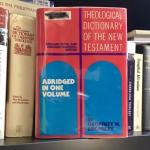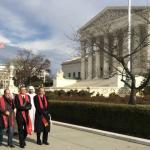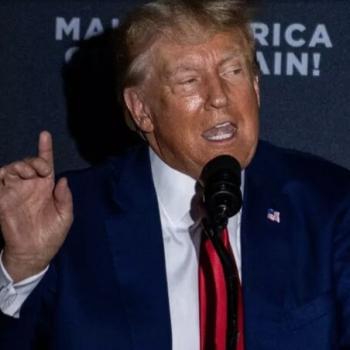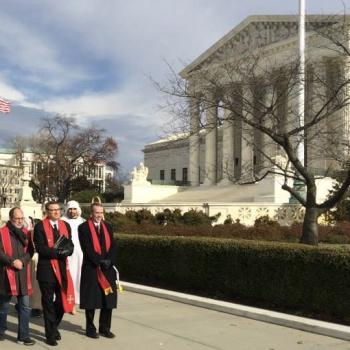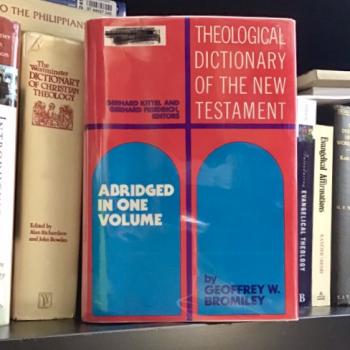Contrary to a popular evangelical myth, the U.S. federal government is not hostile to the Christian faith. In fact, not only is it friendly to religion, but it employs more Christian ministers than many denominations. Various agencies grant these chaplains broad freedoms, including preaching content, personal communications, worship, prayer, and even evangelistic activities. When conflicts over the religious prerogatives of federal chaplains and their charges arise, adequate internal mechanisms exist for resolution. (Also see https://icece-endorsers.com/)
The Myth And Its Origins
The popular myth promulgated among evangelicals alleges that the U.S. federal government is fundamentally hostile to the Christian faith. Many national evangelical ministries foster the notion that federal authorities forbid sharing the gospel, publicly displaying Bible verses, and praying in Jesus’ name. In its worst forms, the folk tale has federal authorities surveilling chaplains, threatening them with extreme restrictions, and punishing them by silencing, firing, or even jailing them.
The Myth’s Purpose
The purpose of the myth is three-fold: To demonize the federal government, to alarm evangelical constituents, and to mobilize a response–often in the form of donations. Many successful fundraising campaigns often are built on ginning up fear and anger. To make people afraid and mad requires a bogeyman. An impersonal force like “the federal government” makes a great one. People can project on such a generic reference whatever their imaginations can conjure up: a faceless cabal in a dark, smokey room, a satanic powermonger who hates God’s people, or a godless “woke” socialist deep state actor intent on attacking what makes America great.
Damage Done By The Myth
Regarding supposed anti-religious government bias, evangelical organizations and celebrities have exaggerated conflict, cherry-picked colorful incidents, and sometimes invented crises out of whole cloth. The result is our almost paranoid, inordinately defensive, anti-government disposition. An entire sector of the evangelical populace is now belligerent regarding government and social organization, except for its organizing against such organization. However, its organizing is more the following of a strongman leader in lockstep than it is a sui generis expression of a corporate will. My tribal leaders are doing what they accuse the “evil leftist government” of doing: controlling people’s lives.
This sad state of affairs has also created a modern feudal system in which the small donor class produces a crop of money for the Christian celebrity Hero class. The Heroes, in turn, preserve and protect the serf’s “God-given” rights to believe and live as they want (or as their interpretation of their Bible directs them to live)–but only as long as the serfs continue to deliver their (literal) cash crop to the Lord of Manor. Hundreds of millions of messages sent out to the Christian serfs warn, “We can only win back what the enemy has taken from you if you send in your $25, $50, or $100!”
Perpetuating the myth enables the exploitation of tens of millions of evangelicals, many of whom are simple, working-class people. It also isolates them from their neighbors, fellow church members, and families. These fractured and destroyed relationships leave these people vulnerable to further exploitation as they become more and more emotionally dependent on their supposed “protectors.” Church congregations suffer as they become divided by political tensions, suspicion disintegrates communities, and the contentiousness peddled by these grifters on a grand scale weakens the country.
Truth Vs The Myth
The U.S. federal government is not hostile to the religious beliefs and practices of those who populate and manage it- you and me. Sure, there are occasional abusers, violators, and generally bad people who misuse their powers and privileges to harm others and benefit themselves. We have ways of dealing with them, too. Corrupt actors are regularly rooted out of the system and punished if appropriate, which brings me back to religion and religious liberty.
Not only is there a robust religious presence among the people and programs of the federal government–just as there is among the general populace–but that presence is overwhelmingly Christian, and “conservative Christian” at that. Chaplains in every sector, including those employed by the federal government, report high levels of job satisfaction. (Also see https://tinyurl.com/5n638ajn) Of the thousands of Christian workers ministering within the federal system, only a few have ever filed suit for abridgment of their religious liberty.
Myth Is Wrong On Government And Religion
The truth is the American system of government is the way we, its citizens, organize ourselves to ensure “a more perfect Union, establish justice, insure domestic tranquility, provide for the common defense, promote the general welfare, and secure the blessings of liberty to ourselves and our posterity,” as the Constitution declares. Sometimes this requires we regulate our religious expression, give deference to others, and at least accommodate the rights of others, if not improve ourselves individually and as an American people by learning from our fellow Americans’ religious distinctives. “Domestic tranquility” is achieved, in part, when neighbors, friends, fellow church members, and even our relatives gather across all kinds of differences, compromise our preferences, agree to abide by certain rules, politely air our opinions, and congenially compete to win others to our side.
When some threaten to damage this social equilibrium, the majority or a persuasive minority admonishes them to “get with the program.” When others attempt to dismantle the protections of liberty and security, the force of law stops them and hopefully corrects them. For those who physically or otherwise damage the structures that safeguard justice, tranquility, the common defense, general welfare, or the blessings of liberty, we suspend their participation in the project and shield others from further injury by sanctioning the perpetrators, sometimes by placing them in prison. This is how “government of the people” operates–to everyone’s benefit.
Dispelling The Myth Once And For All
Not only does the federal government earnestly protect religious liberty on every level, but it fosters it by recruiting and respecting chaplains, compensating them fairly, and providing beautiful, well-funded, and resourced chapels, prayer rooms, and other sacred spaces. The groups using these resources are self-led and autonomous in governing their affairs and conducting their spiritual life and mission. Chaplains are not only free to believe, practice, and communicate their deeply held spiritual convictions, but their employment obligates them to do so!
The reality of a vibrant Christian presence, expression, and community inside the federal government will likely be unsettling to some–and it most certainly won’t raise the kind of money that the government-as-enemy-of-faith myth raises. Still, we should be thankful that it exists within the governmental culture and system. (Sure, there is much more to do to equalize religious representation among the federal workforce, and steps are underway now to do so.)
Religion of every kind has proven to be a positive factor in everything from personal happiness to community cohesion and national security, but that’s commentary for me to offer in a future column. For now, let’s set the record straight: No matter what the next ministry fundraising message you get says, the truth is the federal government is not hostile to Christian faith–it is, in fact, highly supportive of it.



